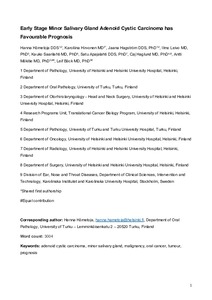Early stage minor salivary gland adenoid cystic carcinoma has favourable prognosis
Hämetoja H; Hirvonen K; Hagström J; Leivo I; Saarilahti K; Apajalahti S; Haglund C; Mäkitie A; Bäck L
Early stage minor salivary gland adenoid cystic carcinoma has favourable prognosis
Hämetoja H
Hirvonen K
Hagström J
Leivo I
Saarilahti K
Apajalahti S
Haglund C
Mäkitie A
Bäck L
SPRINGER
Julkaisun pysyvä osoite on:
https://urn.fi/URN:NBN:fi-fe2021042718030
https://urn.fi/URN:NBN:fi-fe2021042718030
Tiivistelmä
The purpose of the study was to evaluate the long-term outcome of minor salivary and mucous gland (MiSG) adenoid cystic carcinoma (ACC) of the head and neck and to compare the results with earlier reports including our recently published series on major salivary gland (MaSG) ACC. The study comprised 68 MiSG ACCs operated during 1974-2012 at the Helsinki University Hospital, Helsinki, Finland. Medical records and histological samples were reviewed. Our previously published cohort comprising 54 MaSG ACCs during the years from 1974 to 2009 was used for comparison. The most common locations were the oral cavity and sinonasal cavities. Most patients presented stages IV (33.8%) and I (23.5%) disease. Primary treatment with curative intent, mainly surgery, was offered for 64 patients. Thirty-three (51.6%) of these patients developed a disease recurrence and 22 (66.7%) patients in less than 5 years. The difference in the length of recurrence-free time (< 5 vs. > 5 years) had an impact on OS and DSS (p < 0.001) showing worse prognosis for the earlier recurring group. T classes 2-4 (p = 0.005, p < 0.001, and p = 0.001, respectively) and stages II-IV (p = 0.019, p < 0.001, and p = 0.002, respectively) were associated with worse OS, DSS, and DFS. MiSG ACC had a similar long-term survival compared to MaSG ACC. Patients with stage I MiSG ACC seem to carry a favourable prognosis compared with those with stages II, III, and IV tumours. It is thus noteworthy that stage II tumours represent a truly advanced disease entity warranting a more aggressive treatment approach.
Kokoelmat
- Rinnakkaistallenteet [27094]
